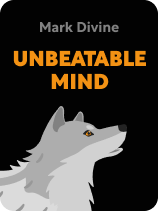

This article is an excerpt from the Shortform book guide to "Unbeatable Mind" by Mark Divine. Shortform has the world's best summaries and analyses of books you should be reading.
Like this article? Sign up for a free trial here.
Wondering how to be mentally tough? How did Navy SEAL Mark Divine train his mind for mental toughness? What are the benefits?
In his book Unbeatable Mind, Mark Divine explains his five-step system for developing a warrior mindset that fosters mental toughness. According to him, you must train your mind and body to be resilient both mentally and emotionally.
Read on to learn how to be mentally tough to better manage life stressors, according to Divine’s advice.
How to Be Mentally Tough
In Unbeatable Mind, Mark Divine offers a guide for developing a warrior mindset that allows you to reach your full potential as a person and then apply that to improving your life and the lives of others. Divine writes that learning how to be mentally tough means mastering five levels of personal development by cultivating character traits that maximize your personal and interpersonal abilities, focusing your mind on your true purpose as a human and then working toward that purpose, and training your body and mind through breathing exercises and meditative practices.
Emotional Strength
According to Divine, to train your mind to be mentally tough, you must forge emotional strength. If you build emotional strength, you can weather the emotional storms that come with every challenge you face, keeping strong in the face of adversity and using challenges to help you grow and fulfill your purpose. Use your purpose to guide your actions and motivate you during difficult times.
(Shortform note: Our natural tendencies regarding challenges are to either avoid the challenge entirely or overly fixate on it, depending on our personalities and the way we were raised. The key to emotional strength is finding the middle ground between these two tendencies and facing challenges without letting them overwhelm us.)
How to Build Emotional Strength
In learning how to be mentally tough, Divine says you should build your emotional strength, writing that you must:
Cultivate high self-esteem so you feel respected by others. (Shortform note: Divine doesn’t elaborate on why self-esteem is important for emotional strength, but we can infer that high self-esteem will help you bounce back from negative experiences and avoid internalizing them.)
Build up your self-control so you don’t react emotionally in the moment and inadvertently make the situation worse. (Shortform note: To build self-control in conversations, it may help to imagine yourself pressing a button to pause your mind and take several seconds to fully process what was said before giving your response.)
Take on a positive mindset so you can view setbacks as opportunities. (Shortform note: A positive mindset serves you best when it’s based in reality and takes into account your skills and resources so you feel equipped to handle the setbacks you’ll face.)
Orient yourself toward helping others. Tending to others will help you find meaning in your struggles. (Shortform note: Experts agree that helping other people helps you make sense of your own life’s challenges, and they add that it can help you find your purpose as well.)
Divine also writes that the biggest roadblock to achieving emotional strength is the negative emotions that result from hardships you face. However, when you encounter one of these negative emotions, you can build emotional strength by processing it effectively.
When a negative emotion strikes, acknowledge the emotion without letting it convince you that there’s something wrong with you. Then dig deeper: Find what is underlying that emotion, and then change that emotion into its corresponding positive emotion (such as turning envy into compassion, or turning anxiety into self-assuredness). Take that positive emotion and internalize it, letting it drown out the negative one, and finally, use this new mindset to enact positive change in yourself or to help others.
(Shortform note: Turning a negative emotion into a positive one can help you minimize negative feelings in your life, but you may also be able to use the negative emotions themselves to motivate you to make change. If you’re struggling to turn anger into forgiveness, for example, you could try using that anger to spur a major life change. If a negative emotion leads to positive change, like if anxiety motivates you to begin therapy, it can be reclassified as a positive emotion.)
Mental Strength
Divine also writes that fulfilling your purpose requires learning how to be mentally tough. Mental toughness gives you the ability to power through obstacles that stand in the way of reaching your goal. Divine’s advice on building mental toughness focuses on managing stress. Mental toughness can help you process stress in a productive way to keep you moving on your path to your purpose.
(Shortform note: Other writers agree that stress is one of the biggest obstacles in our lives and add that people often resist stress management because some of our stress responses were survival mechanisms in childhood, and it can be difficult to let those go.)
Stress
We tend to view stress as the source of our internal problems, but Divine says that very belief is actually the source of these problems. To be mentally tough, he emphasizes that we should view stress as neutral, and that whether our stress is negative or positive is a matter of how we frame it.
If we view stress negatively, we might develop a victim mentality, feeling like we’re at the mercy of the stressors in our lives. But, if we view stress in a positive light, we can use it to facilitate our growth, strengthen our minds, and work toward our purpose.
(Shortform note: Research supports the idea that our perception of stress affects its impact on our health and that viewing stress as a major negative influence in our lives even corresponds to a shortened lifespan.)
Divine offers a method for managing stress productively, similar to the process for managing negative emotions. First, acknowledge the stressor and the effect it’s having on you, and remember that experiencing this stress doesn’t make you a worse person. Then, intercept the effects of the stressor, reframing it to have a positive impact on your mind and body.
Through this process, you’re training your mind to overcome the brain’s stress response and act in the moment to work through your crisis calmly.
(Shortform note: Managing stress productively may even prevent certain types of brain damage, as research shows that chronic stress can change the structure of the brain, including causing it to shrink.)

———End of Preview———
Like what you just read? Read the rest of the world's best book summary and analysis of Mark Divine's "Unbeatable Mind" at Shortform.
Here's what you'll find in our full Unbeatable Mind summary:
- Advice from a former Navy SEAL on how to maximize your success
- Tools for training your mind and developing mental toughness
- Why you should come up with a mantra for yourself






